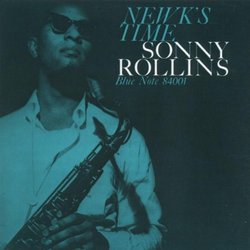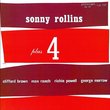| All Artists: Sonny Rollins Title: Newk's Time Members Wishing: 0 Total Copies: 0 Label: Blue Note Records Original Release Date: 1/1/2000 Re-Release Date: 1/5/1990 Genres: Jazz, Pop Styles: Modern Postbebop, Bebop Number of Discs: 1 SwapaCD Credits: 1 UPC: 077778400127 |
Search - Sonny Rollins :: Newk's Time
 | Sonny Rollins Newk's Time Genres: Jazz, Pop
Personnel: — Sonny Rollins: tenor sax — Wynton Kelly: piano — Doug Watkins: bass — Philly Joe Jones: drums The RVG Series consists of classic Blue Note albums newly remastered in 24-bit by the original engineer, legendary Rud... more » |
Larger Image |
CD DetailsSynopsis
Album Description Personnel: Sonny Rollins: tenor sax Wynton Kelly: piano Doug Watkins: bass Philly Joe Jones: drums The RVG Series consists of classic Blue Note albums newly remastered in 24-bit by the original engineer, legendary Rudy Van Gelder, with state-of-the-art equipment. Reissues produced by Michael Cuscuna. Similar CDs
|
CD ReviewsA Short and Sweet Classic Todd M. Stellhorn | baltimore, MD | 07/30/2007 (5 out of 5 stars) "Sonny Rollins has a massive discography, and within that discography there are many great, even classic, albums. But for my money this is the place to start, and the place where I most often come back to. For one thing Rollins is the sole horn on this date, and his backing is as smooth as the worn ivory of Monk's piano. Doug Watkins, though it's hard to tell from this uncharacteristically bass-lite mix, was one of the top bassmen ever (I highly recommend his album: "Watkins at Large", or Donald Byrd's "Byrd's eye view", both featuring hank mobley, to get a better idea about what he could do). In addition Philly Joe Jones is at his beat-conscious, blue flame, simmering best, and Wynton Kelly is a good choice to accompany Rollins as his piano playing has an emphatic quality to it that accentuates the volatile Rollin's solos. And what solos they are. On "Newk's Time" Rollins is at his searing, sputtering, round-toned, passionate best. Though "vol.2" is also a five star classic, it was cluttered by the musings of all those other legends and didn't give Rollins enough time to shine. At his personal best Rollins loved space and time to roam around in, to see where he could go, and to extend his ideas (see "way out west" and the live villiage vanguard recordings), he gets that here to a slightly more structured and polished degree. Indeed the only thing wrong with this album is that it isn't longer, but in music, as in life, it's quality, not quantity, that counts for the most." Sonny Pitches a winner with Philly Joe in the Roy Campanella Samuel Chell | Kenosha,, WI United States | 12/17/2007 (5 out of 5 stars) "The last time I caught Rollins (just under ten years ago) he opened the concert with a string of over 50 solo blues choruses in succession (we actually counted). That's the kind of "generous" Rollins you'll hear on this session, as good a Rollins' recording as I've heard ("Way Out West" and "The Bridge" both have more restrained Rollins and thin accompaniment textures that begin to sound repetitious). Rollins here plays with the fire, inventiveness, and total commitment to melody of the best beboppers yet retains his flare for motivic development, constantly surprising the listener with unusual rhythmic patterns, and with what he does and doesn't repeat during the solo. Additionally, there are surprises in the arrangements: a rhythm instrument will lay out or, as in the case of "Surrey," piano and bass stay out all the way.
Give much of the credit for this exceptional session to an exceptional rhythm section. Philly Joe was in his prime, Miles' favorite drummer and the hippest percussionist of the 1950s; Wyn Kelly was beginning to emerge as one of the top 3 "grooving" pianists (along with Red Garland and Gene Harris), and would soon be hired by Miles. Finally, Doug Watkins was the "clincher," the reason I decided to add this CD to my collection. He not only "plays" the bass: he "is" the instrument, incapable of not swinging. It's a pleasure to listen to him simply take a walking bass solo (as is the case on "Blues for Philly Joe"). Purchasers in the digital age may be disappointed that there are no "out-takes" or unused tracks to fill up the extra space of a CD. The album, moreover, may lack some of the fire of "Eternal Triangle" ("Sunny Side Up"), "Tenor Madness" or "Sonny Rollins, Vol. 2," and it may not enjoy the "classic" status of "Saxophone Colossus" or "At the Vanguard," but it makes a strong claim as Rollins' strongest recording session. it's no less a tour de force for Philly Joe who, on this session, is both head cook and a second voice trading melodic ideas with the featured soloist. In short, he calls a good game, motivating the featured performer to serve up an indisputable winner." |

 Track Listings (6) - Disc #1
Track Listings (6) - Disc #1
